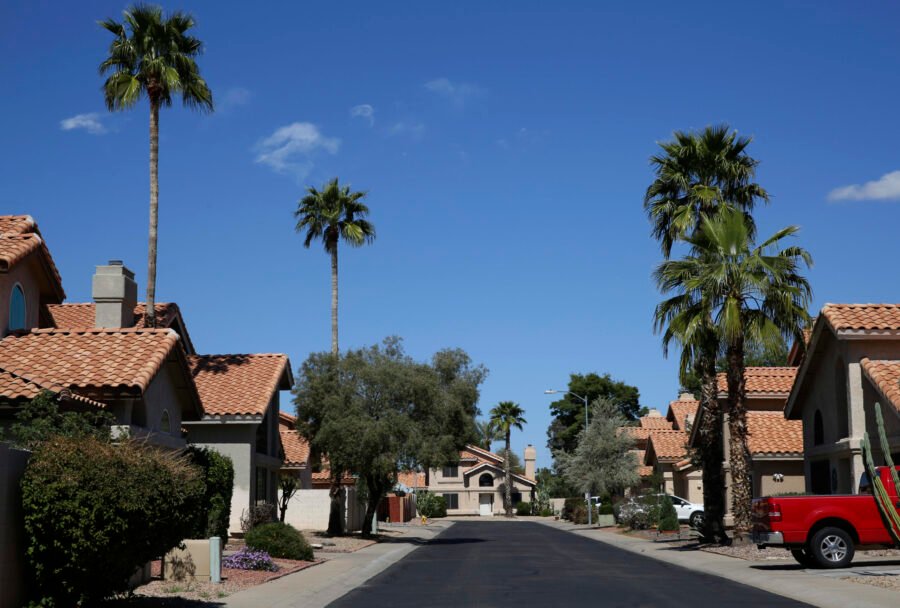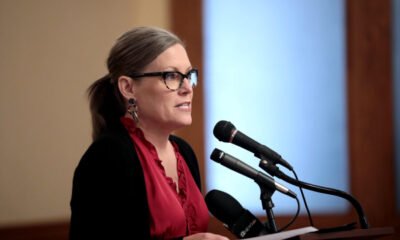affordable homes
Hobbs Champions Arizonans Over Investors with ‘Starter Homes Act’

Facing internal party pressures, Arizona Governor Katie Hobbs has unveiled a plan aimed at easing city regulations to promote the construction of “starter homes.” This initiative comes as a response to concerns over housing affordability in the state.
Interestingly, the proposed plan is more restrictive in certain areas than recently passed Senate measures, covering a broader range of cities. It also introduces a unique stipulation: a portion of these new homes must be allocated for Arizonans who intend to reside in them rather than investors seeking profits.
This shift occurs a year after Hobbs vetoed a similar proposal under pressure from the League of Arizona Cities and Towns, deeming it “unprecedented legislation” that could jeopardize housing reform outcomes. However, the urgency to address housing costs has led some lawmakers to push for changes in policy.
Senator Shawnna Bolick of Phoenix, who authored the controversial SB1229, has modified her initial proposal to reflect city concerns. Key among these adjustments is the preservation of city rights to impose “impact fees” on new developments. These fees ensure developers contribute their fair share towards the infrastructure requirements of the community.
Despite these changes, the League is still dissatisfied, advocating for minimal restrictions on city councils regarding development standards. Additionally, they are backing a less stringent alternative proposed by Senator Vince Leach, though obtaining a hearing for this alternative has proven challenging.
With Bolick’s proposal on the table and Hobbs now weighing her options, the governor appears open to aspects of the Senate-passed legislation. Notably, she supports a cap on minimum lot sizes at 3,000 square feet, intending to promote higher density and lower costs.
Moreover, the proposed plan is adaptable; in developments exceeding 10 acres, only half the homes would need to be on smaller lots, leaving room for varied lot sizes elsewhere.
Other criteria include limiting setbacks from the street to 10 feet rather than the 20 feet some cities desired, specifically in front of garages to ensure sufficient parking space. However, Hobbs is not inclined to restrict the requirement for garages in newly constructed homes.
One contentious point of the proposal is the governor’s aim to prevent cities from dictating design details. This would avoid mandates for features like rear yard patios or decorative enhancements that do not contribute to the home’s structure.
Hobbs’ approach would eliminate requirements for community amenities such as parks or pools and would limit the imposition of walls and fences near non-residential land.
Importantly, Hobbs’ proposal is designed to affect communities with populations above 30,000, drastically widening the impact compared to the Senate bill, which focuses solely on larger cities with 70,000 residents or more. This broader scope is intended to address housing affordability issues affecting various urban areas across Arizona.
Despite emerging challenges, the governor’s office maintains that these proposed regulations aim to streamline housing development and improve affordability for residents. However, key debates around ensuring that starter homes remain accessible to those in need continue to loom.
While cities wish to cap initial home sales for low-income buyers at 120% of the area median income, this has become a sticking point. Advocates for affordable housing argue against such limits, fearing they would exclude essential workers from homeownership.
An alternative in Senator Leach’s proposal suggests a stipulation requiring buyers of starter homes to commit to residing there for at least 15 years, a condition Hobbs has rejected in favor of mandating that half of the homes on smaller lots be sold to owner-occupants. Additionally, any sale within the first five years would need to go to someone intending to live there.
This directive underscores the governor’s commitment to ensuring that newly constructed homes benefit local families rather than investors. Nevertheless, critics express concerns over the potential mobility issues arising from the occupancy requirement, particularly for those whose jobs may necessitate relocation.
As discussions progress, it remains uncertain whether a compromise will emerge that can garner sufficient legislative support to pass into law, echoing the broader housing affordability challenges facing Arizona today.










![Members of the Arizona House of Representatives vote during a third reading of nearly three dozen bills at the Arizona State Capitol on March 4, 2025. [Monica D. Spencer]](https://arizonanews.org/wp-content/uploads/2025/06/SR-347-Secures-53M-in-Third-State-Budget-Draft-Awaiting-400x240.jpg)
![Members of the Arizona House of Representatives vote during a third reading of nearly three dozen bills at the Arizona State Capitol on March 4, 2025. [Monica D. Spencer]](https://arizonanews.org/wp-content/uploads/2025/06/SR-347-Secures-53M-in-Third-State-Budget-Draft-Awaiting-80x80.jpg)






